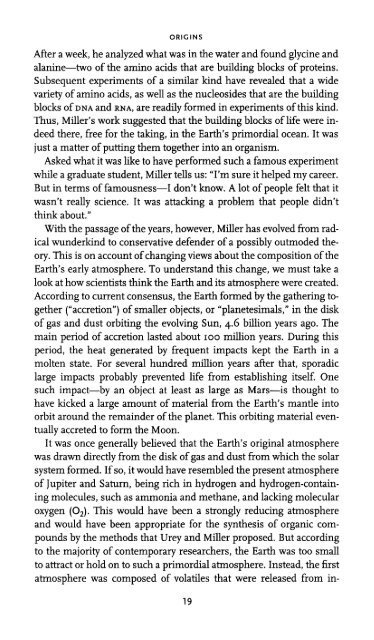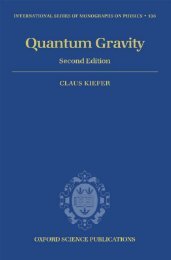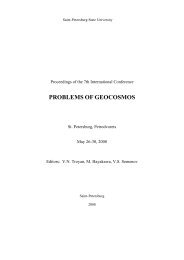- Page 2: Here Be Dragons
- Page 6: David Koerner Simon LeVay OXFORD UN
- Page 10: Contents Acknowledgments vi Introdu
- Page 14: Here Be Dragons
- Page 18: Introduction V* At the Institute fo
- Page 22: INTRODUCTION Sun—towers above the
- Page 26: INTRODUCTION force and nature remai
- Page 32: INTRODUCTION digital organisms aliv
- Page 36: This page intentionally left blank
- Page 40: HERE BE DRAGONS mated on the Fourth
- Page 44: HERE BE DRAGONS minutes ago, rather
- Page 48: HERE BE DRAGONS the same need for t
- Page 52: HERE BE DRAGONS including life—an
- Page 56: HERE BE DRAGONS falling planetesima
- Page 60: HERE BE DRAGONS A particularly inte
- Page 64: HERE BE DRAGONS in the original Mil
- Page 68: HERE BE DRAGONS life would take pla
- Page 72: HERE BE DRAGONS they should contain
- Page 76: HERE BE DRAGONS Yet Orgel, more tha
- Page 80:
HERE BE DRAGONS Then, the new ribon
- Page 84:
HERE BE DRAGONS entific definition.
- Page 88:
HERE BE DRAGONS similar techniques,
- Page 92:
This page intentionally left blank
- Page 96:
HERE BE DRAGONS salt and gypsum cry
- Page 100:
HERE BE DRAGONS Earth—environment
- Page 104:
HERE BE DRAGONS ganisms have to mak
- Page 108:
HERE BE DRAGONS had a broken leg at
- Page 112:
HERE BE DRAGONS How is the flexibil
- Page 116:
HERE BE DRAGONS Methanopyrus makes
- Page 120:
HERE BE DRAGONS need for minerals o
- Page 124:
HERE BE DRAGONS handed amino acids
- Page 128:
HERE BE DRAGONS ganisms, the cyanob
- Page 132:
HERE BE DRAGONS tions ago. If we fo
- Page 136:
HERE BE DRAGONS algae. This associa
- Page 140:
HERE BE DRAGONS Doolittle of the Un
- Page 144:
HERE BE DRAGONS rocketry, and it th
- Page 148:
HERE BE DRAGONS the British sunspot
- Page 152:
HERE BE DRAGONS warmest it ever get
- Page 156:
HERE BE DRAGONS disproved the exist
- Page 160:
HERE BE DRAGONS in its history, as
- Page 164:
HERE BE DRAGONS Borealis when it wa
- Page 168:
HERE BE DRAGONS ALH8400I is a bit o
- Page 172:
HERE BE DRAGONS globules. He found
- Page 176:
HERE BE DRAGONS the occasional alig
- Page 180:
HERE BE DRAGONS ration of Mars will
- Page 184:
HERE BE DRAGONS get too cold. Even
- Page 188:
HERE BE DRAGONS ments about conditi
- Page 192:
HERE BE DRAGONS nebulous project, t
- Page 196:
HERE BE DRAGONS directly, unless it
- Page 200:
HERE BE DRAGONS Milky Way, our home
- Page 204:
HERE BE DRAGONS The dense regions w
- Page 208:
HERE BE DRAGONS 4.1 Schematic overv
- Page 212:
HERE BE DRAGONS words, the disk act
- Page 216:
HERE BE DRAGONS cloud complex. The
- Page 220:
HERE BE DRAGONS diation, T Tauri st
- Page 224:
HERE BE DRAGONS believed to be the
- Page 228:
HERE BE DRAGONS ation from the star
- Page 232:
HERE BE DRAGONS SUGGESTED READING K
- Page 236:
HERE BE DRAGONS indeed periodically
- Page 240:
HERE BE DRAGONS tates once every 6.
- Page 244:
HERE BE DRAGONS pounds present in t
- Page 248:
HERE BE DRAGONS We have the opportu
- Page 252:
HERE BE DRAGONS liquid water on the
- Page 256:
HERE BE DRAGONS bodies. Although th
- Page 260:
HERE BE DRAGONS tected the same pla
- Page 264:
HERE BE DRAGONS 5.2 Interferometry
- Page 268:
HERE BE DRAGONS arate the light fro
- Page 272:
HERE BE DRAGONS entations, an image
- Page 276:
HERE BE DRAGONS then there should b
- Page 280:
HERE BE DRAGONS Indian Art, which i
- Page 284:
HERE BE DRAGONS each other to produ
- Page 288:
HERE BE DRAGONS Joyce is more equiv
- Page 292:
Life within rock. Above: University
- Page 296:
The Orion nebula, in a Hubble Space
- Page 300:
Planet birth This is a young star,
- Page 304:
Creatures of the Burgess shale. A f
- Page 308:
HERE BE DRAGONS With K greater than
- Page 312:
HERE BE DRAGONS bodies. Just in the
- Page 316:
HERE BE DRAGONS early work, was a h
- Page 320:
HERE BE DRAGONS creatures into exis
- Page 324:
HERE BE DRAGONS vant. My suspicion
- Page 328:
HERE BE DRAGONS the level of DNA. T
- Page 332:
HERE BE DRAGONS involved diversific
- Page 336:
HERE BE DRAGONS slopes of that peak
- Page 340:
HERE BE DRAGONS maining eight 2-bas
- Page 344:
HERE BE DRAGONS converged on it. Bu
- Page 348:
HERE BE DRAGONS worth spending a li
- Page 352:
HERE BE DRAGONS it also has somethi
- Page 356:
HERE BE DRAGONS alize his plans. Wi
- Page 360:
HERE BE DRAGONS "magic frequencies.
- Page 364:
HERE BE DRAGONS and not finding one
- Page 368:
HERE BE DRAGONS age. Hence SETI res
- Page 372:
HERE BE DRAGONS when we moved the t
- Page 376:
HERE BE DRAGONS each 0.6 hertz wide
- Page 380:
HERE BE DRAGONS The Nobel Prize win
- Page 384:
HERE BE DRAGONS of the Earth's orbi
- Page 388:
HERE BE DRAGONS ferometry to planet
- Page 392:
HERE BE DRAGONS (which may extend a
- Page 396:
HERE BE DRAGONS dictions have contr
- Page 400:
HERE BE DRAGONS After 20 miles, an
- Page 404:
HERE BE DRAGONS said, he had been h
- Page 408:
HERE BE DRAGONS people with no real
- Page 412:
HERE BE DRAGONS Nevertheless, the r
- Page 416:
HERE BE DRAGONS nesses on the groun
- Page 420:
HERE BE DRAGONS Our very own UFO Or
- Page 424:
HERE BE DRAGONS hydraulics so it co
- Page 428:
HERE BE DRAGONS Silicon sits right
- Page 432:
HERE BE DRAGONS restrial biochemist
- Page 436:
HERE BE DRAGONS Feinberg and Shapir
- Page 440:
HERE BE DRAGONS Tierra, a computer
- Page 444:
0HERE BE DRAGONS harder and harder
- Page 448:
HERE BE DRAGONS have a certain resp
- Page 452:
HERE BE DRAGONS Chinese is put in a
- Page 456:
HERE BE DRAGONS loading technology
- Page 460:
HERE BE DRAGONS creator on the line
- Page 464:
HERE BE DRAGONS formational systems
- Page 468:
HERE BE DRAGONS mind. 16 Richard Ca
- Page 472:
HERE BE DRAGONS "An obvious fix," F
- Page 476:
HERE BE DRAGONS ters by one. "We sh
- Page 480:
HERE BE DRAGONS habit is not all th
- Page 484:
HERE BE DRAGONS ground radiation fr
- Page 488:
HERE BE DRAGONS ground does indeed
- Page 492:
HERE BE DRAGONS in the fabric of sp
- Page 496:
HERE BE DRAGONS wise be seen. The M
- Page 500:
HERE BE DRAGONS has recently offere
- Page 504:
HERE BE DRAGONS provides evidence f
- Page 508:
CONCLUSIONS will—it is a fundamen
- Page 512:
CONCLUSIONS nology to assemble DNA-
- Page 516:
CONCLUSIONS soon as circumstances p
- Page 520:
CONCLUSIONS We believe that this ar
- Page 524:
CONCLUSIONS rolls. Or maybe we'll c
- Page 528:
NOTES TO CHAPTER 1 "Before Enzymes
- Page 532:
NOTES CHAPTER 3 13 J.L. Bada, et al
- Page 536:
NOTES CHAPTER 5 3 A. Wolszczan, "Co
- Page 540:
NOTES CHAPTER 7 14 E. Jones, "Where
- Page 544:
NOTES TO CONCLUSIONS (Cambridge: Ha
- Page 548:
Big Pine, California, 193 Bios Grou
- Page 552:
INDEX 161-162,166-168,175 Greenhous
- Page 556:
Networks, Boolean, 136-140 Neumann,
- Page 560:
Turing, Alan, 209 UCLA, 2 Ufomind,













